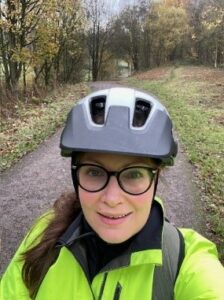Case study – Sustainable Travel Challenge
Project: The Medicines Optimisation team’s sustainable travel challenge
Organisation: Medicines Optimisation (MO) team based at NHS Lancashire & South Cumbria Integrated Care
What was the issue?
The MO team’s usual base of Jubilee House in Leyland was closed over the summer and their monthly team meeting was moved to County Hall in Preston. The team’s travel to this new location presented various challenges, including heavier traffic, complex one-way road systems, and expensive and inconvenient parking.
However, County Hall also offered many more sustainable travel options which were previously inaccessible at Jubilee House, as it had good public transport connections and was on a cycling network. Previously, 86 percent of the MO team would drive a car to work (single occupancy) at a distance varying from 1.5 to 40 miles.
What Action was taken?
Tasked by the team’s Green Champions, Rachel Wilson and Julie Lawson, a two-month travel challenge was set. All team members were asked to research different ways to travel to County Hall and then attempt to travel there via a more sustainable method than they normally used.
Once the two-month period was up, the MO team were asked to complete a survey about the challenge, 14 people out of 20 completed the survey and the results were very promising:
- The challenge prompted 92 percent of the team to look at alternative ways to travel, and all of them found more sustainable options were available.
- In total, 71 percent of the team managed to make a more sustainable journey to work during the two-month period.
- Car sharing was the most popular choice of travel (50 percent), followed by train (14 percent), bike (seven percent) and other (seven percent).
What was the Delivering a Net Zero NHS Benefit?
NHS staff commute to work produces 560 Kt Co2e a year (NHS England Net Zero Travel and Transport Strategy, 2023) so any changes to how staff commute and travel will have a positive impact on reducing this impact. By encouraging staff to try more sustainable methods of commuting to work not only will the carbon emissions reduce but staff will feel encouraged to continue more sustainable travel options both in and outside work. As was seen, this challenge has prompted many team members to find more sustainable ways of travelling to work, which they will continue to use on a regular basis. Well done to all involved!
What are the wider Benefits?
The wider benefits lie in a reduction in the cost of staff commuting as they do not need to pay for parking or as much fuel. There is also the possibility that the positives of this change will inspire more sustainable active travel to trickle down to outside their working life and into everyday travel. A reduction in air pollution is another wider benefit due to less cars being used for the commute this has benefits for the respiratory health or those in the local area.
Want to reduce your carbon footprint?
If you are inspired by this challenge, why not set yourself the task of reducing your environmental impact next year? A great place to start is to complete the WWF’s environmental footprint calculator which will help you to work out what your current impact on the environment is and the many ways to improve this.
Key Contact and Email: rachel.wilson62@nhs.net
